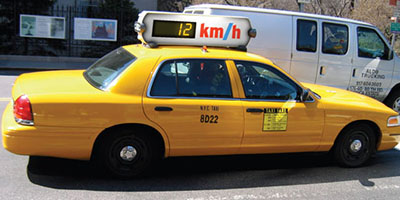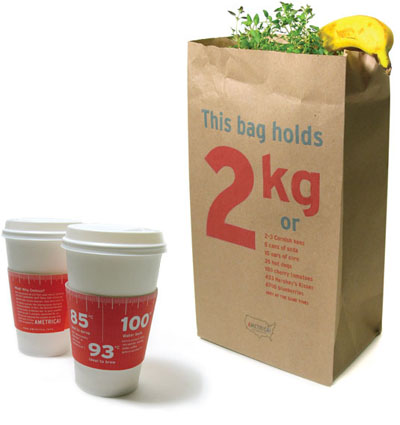Ametrica
- Metric Tags:
Hunt: First, what is "Ametrica!"?
Wang: "Ametrica!" is an awareness campaign to help convert the United States to the metric system. No one thinks about an act as routine as measuring, much less the impact it can have on education, economy, and health. Through bold numbers and subtle humor, viewers are initially invited to interact with the pieces and their environment such that they experience metric units directly, rather than through comparison with customary units (which perpetuates the problem of dependency on the old units). Those intrigued by the issue are then directed to visit the Ametrica! website for more information, interactive components, and motion graphics experiences.
Hunt: What led you to pursue the tremendous task of changing a country's measurement system?
Wang: My class was asked to turn in thesis ideas even before the fall of our thesis year. Throughout the entire summer, I hurt my brain trying to find meaningful topics in everyday life, but I couldn't come up with anything. So I ended up submitting the idea I had at the beginning of the summer, one I blurted out in a moment of jest. Many of my classmates are international students. They're from Norway, Mexico, Venezuela, Turkey, Korea. All of those countries work in the metric system, so when these guys came to the States they struggled with the units here. On my part, I found it extremely aggravating that I couldn't hold simple conversations with them sometimes--not because of any language barriers, but because in fact we couldn't find numerical equivalents! Numbers are numbers. There's not the leeway we have when translating words; we can almost always go around words with other ones. But we check the forecast everyday, and note a difference of even one degree. How could my friends and I, sitting in a bar, be expected to whip out calculators to figure out what we mean when someone says, yes, it was so hot, it went up to forty degrees! In one such moment of aggravation, I growled, someone should convert the U.S. to the metric system. It seems impossible, it seems over-the-top ambitious, and rather insane. But really, I stuck to it because I couldn't come up with another idea.

Hunt: The project evolved out of a real experience. There's what seems to be one of those inevitable happy accidents in the name of your project, Ametrica! Can you explain the process of how you came to that name?
Wang: I wanted the name to be very self-explanatory, but for a while didn't work very hard on it because the right name wasn't coming along naturally. I figured I'd know when it came along, and that's how it happened. One day a classmate suggested that there must be a way to combine the idea of the meter and the name of our country, and started playing with some combinations. The light bulb went off in my head immediately, and Ametrica! was born. I'm sure if it had been her project she would have figured out the name right from the beginning. I then wavered with the exclamation point, but only a bit--it says everything you need to know about the tone of the campaign. And that light-hearted, winking aspect is quite central to Ametrica!
Hunt: What has winning the Adobe Design Achievement Award meant to you? Has it opened in new doors?
Wang: It was so recent, and so unexpected, that I haven't figured out the extent of its significance. People say it's a great thing to list on the resume; I guess I'll find out soon enough when I start looking for my first full-time job as a designer. Winning an award such as this one could also be the kind of accomplishment that really boosts one's self-confidence, but being who I am, it just makes me extra wary about keeping up with expectations (others', and my own) in the future.
What has meant quite a lot me, and has been an experience I can call one the most wonderful in my life, was meeting the other Adobe finalists and having the once-in-a-lifetime opportunity to travel three weeks with them. After an awards ceremony held in Toronto this year, Adobe invited us to continue traveling at their expense to attend the Siggraph conference in Boston and the ZeroOne conference in San Jose. At Siggraph, we interned for Guerilla Studio and were asked to design them a signage system in two days. Lyn Bishop from Guerilla Studio said to me, didn't you win the Environmental Design category? Well then, you can be in charge of the group! I looked sheepishly at my fellow finalists as she kept introducing me to other members of the Guerilla Studio as Amy Wang, environmental designer, while these extremely talented designers grinned back, fortunately in understanding. In the end we plopped ourselves down on the carpet right in the hallway and brainstormed for an hour, using whatever pens and scraps of paper we could find. Rather guerilla style. You could feel the cheerful humming of our minds. The discussion went beautifully, with the best idea floating effortlessly to consensus. In the end we came up with not only a concept for their signage, but also a new logo for Guerilla Studio.
Working together under an extremely tight deadline allowed us to become closer because we had to rely on each other's strengths, often so different from our own. At the same time it allowed us to admire these strengths, which we had perceived only indirectly through the exhibits of our work at the Royal Ontario Museum in Toronto. In our free time, which wasn't much after helping out at the conference during the day, we played lots of soccer--incidentally, my peers were once again quite international, and they, of course, found Ametrica! a sensible idea. We cooked many meals together, we got up the next morning at 7 together. We breathed together. In California the soccer was replaced by beach volleyball, and by that time I couldn't imagine existing any other way. Pack mentality, someone called it. But of course it ended. One by one, we caught our flights home, and we sang each other off the same way we'd sung to greet each other earlier during the trip. It was so, so hard. Just by being with them, I've learned much about collaborating; become more aware of my strengths and my weaknesses; and gained a tiny bit more understanding of design concerns, emphases, and approaches across the globe. I'd like to think all of this will help me become a better designer.
Hunt: Certainly the whole experience will coalesce and inform your future work. What do you see as the next step in the Ametrica! project?
Wang: While in San Jose, I got a call from Sappi--I'm receiving the grant I applied for to print and distribute the Ametrica! pitch book. So for the next six months, I will be working to get this book out. With any luck I will also have a job to pay for a roof over my head and a few meals here and there!
Hunt: I doubt that will be a problem. Congrats!
source:http://mfad.typepad.com/crit/2006/09/ametrica_an_int.html

Comments
1
1
1
1